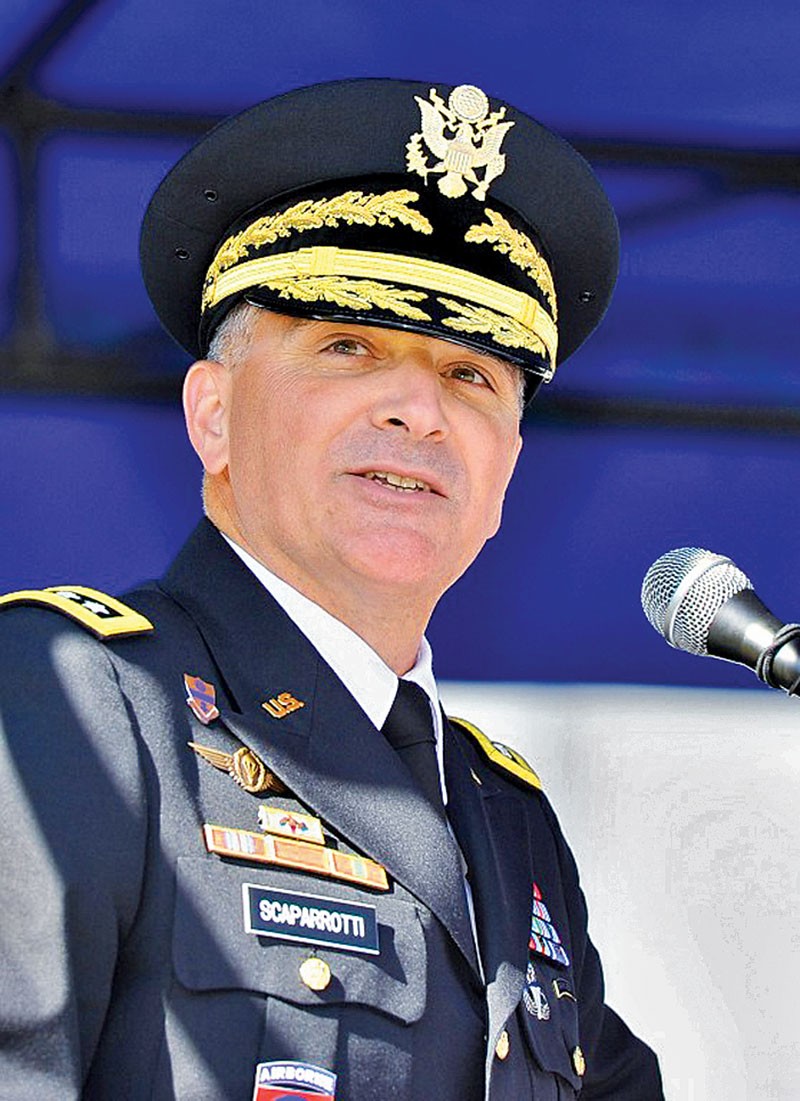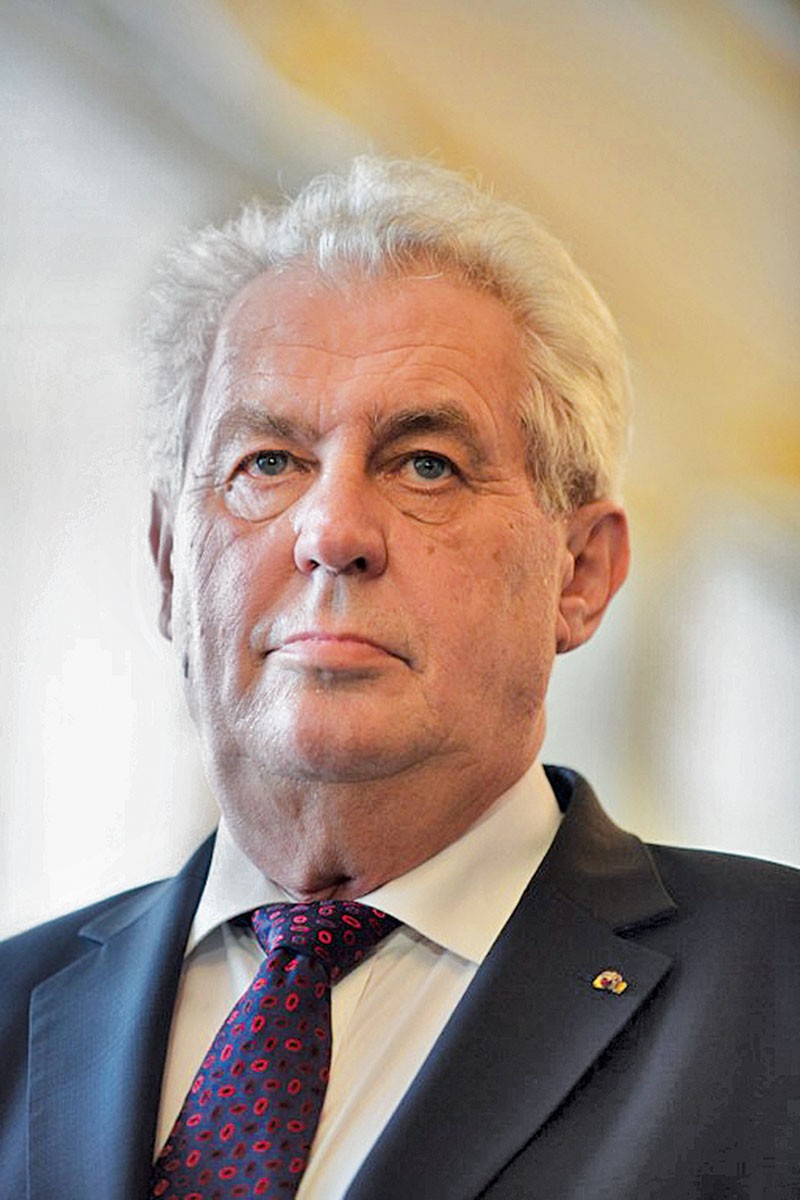Editor’s Note: This feature separates Ukraine’s friends from its enemies The Order of Yaroslav the Wise has been given since 1995 for distinguished service to the nation. It is named after the Kyivan Rus leader from 1019-1054, when the medieval empire reached its zenith. The Order of Lenin was the highest decoration bestowed by the Soviet Union, whose demise Russian President Vladimir Putin mourns. It is named after Vladimir Lenin, whose corpse still rots on the Kremlin’s Red Square, 100 years after the October Revolution he led.
Curtis Scaparroti – Order of Yaroslav The Wise

Incoming US General Curtis Scaparroti delivers a speech during a change of command ceremony for the top commander of US troops in South Korea, at a US Army base in Seoul on October 2, 2013. As the head of USFK, General Curtis Scaparroti will concurrently lead the South Korea-US Combined Forces Command and the United Nations Command, which monitors the truce on the peninsula. AFP PHOTO / JUNG YEON-JE / AFP PHOTO / JUNG YEON-JE
Momentum may be shifting decisively for greater Western support of Ukraine in its three-year battle to defeat Russia’s war in the eastern Donbas and the Kremlin’s illegal annexation of the Crimean peninsula in 2014.
If it does, one of many persons to thank will be U.S. Army General Curtis Scaparrotti.
Scaparroti, the U.S. military commander in Europe, on March 28 spoke in favor of sending advanced weaponry to Ukraine.
“I personally believe we need to consider lethal defensive weapons for Ukraine,” Scaparrotti told a hearing of the U.S. House of Representatives Armed Services Committee.
Ex-U.S. President Barack Obama rejected calls to send lethal defensive weaponry, including Javelin antitank missiles, fearing escalation from Russia. And while U.S. President Donald J. Trump has heaped lavish praise on Russian President Vladimir Putin and seems indifferent to Ukraine, ongoing investigations into his financial ties with Russia and his 2016 campaign’s alleged collusion with Russia appear to have hamstrung him politically, preventing any foreign policy reversal.
Also, some of his top appointees, including U.S. Defense Secretar Jim Mattis, have taken a tougher stance rhetorically against the Kremlin.
And, at the NATO foreign ministers summit in Brussels on March 30-31, U.S. Secretary of State Rex Tillerson will reportedly ask allies to get tougher against Russia.
A Radio Free Europe/Radio Liberty March 28 report quoting “a senior U.S. official” said Tillerson will discuss the need to pressure Russia over “aggression against its neighbors” and fulfill its commitments to end the war in Ukraine.
The same report also says Tillerson will be “consulting with allies about our shared commitment to improve the security situation in eastern Ukraine and the need for NATO to continue to push Russia to end its aggression against its neighbors, and to fulfill the Minsk commitments with regard to Ukraine,” according to the official.
Scaparrotti, who also heads NATO forces, also told members of Congress that Russia remains one of his top three threats to U.S. military interests in Europe. He called on the United States to do a better job of countering Russian misinformation.
“I think one of the most important things we can do is get organized on the information campaign,” said Scaparrotti, according to the Daily Caller. “We have to compete in that environment.” The general said that the U.S. must “show strength that supports our values” when countering Russia’s influence.
All things considered, things are looking up for Ukraine this week.
– Brian Bonner
Milos Zeman – Order of Lenin

Czech Republic’s President Milos Zeman addresses a press conference with newly appointed Prime Minister at Prague Castle on June 25, 2013. Zeman appointed his economic advisor Jiri Rusnok as the new prime minister after an unprecedented corruption scandal toppled his rightwing predecessor. AFP PHOTO / MICHAL CIZEK / AFP PHOTO / MICHAL CIZEK
A tip of the hat to The Daily Caller’s freelance writer, Gabriel Meyr, who on March 27 called attention to U.S. President Donald J. Trump’s invitation to Czech President Milos Zeman to visit the White House in April.
Zeman is seeking to broker a meeting between Trump and Putin.
A Nov. 21, 2014, Washington Post editorial, which called Zeman “a virtual mouthpiece” of the Kremlin, is even more relevant to remember today.
“The current Czech government has distanced itself from Mr. (Vaclav) Havel’s human rights agenda and is dismantling a program he created to support democratic transitions in other dictatorships. President Milos Zeman has become a virtual mouthpiece for Russian President Vladimir Putin, denouncing Russian political prisoners in vulgar terms and denying Russian aggression in Ukraine.”
Meyr notes that “Zeman is a frequent star of Kremlin outlets that amplifies and supports Putin’s policies. He even notoriously supported the Russian claim that Kyiv is ruled by fascists.”
Moreover, The Daily Caller opinion writer notes, “Zeman has denied the presence of Russian forces in Ukraine, stating that ‘I take seriously the statement of [Russian] foreign minister Sergei Lavrov that there are no Russian troops [there] and calling the Russian invasion of Ukraine … a ‘civil war’.
He even proposed the ‘Finlandization’ of Ukraine, meaning that Ukrainian defense and foreign policy would be subject to Moscow.”
Zeman has also opposed European assistance to Ukraine, Meyer writes, even advocating for the European Union to recognize that Crimea is part of Russia and he opposes Western sanctions against the Russian Federation, calling them “ineffective” and “stupid.”
In 2015, Zeman broke ranks with a boycott by Western leaders and visited Moscow to celebrate the 70th anniversary of Victory Day, marking the defeat of Nazi Germany.
Zeman is not the only troublesome leader in Central Europe. Other Kremlin stooges include Slovakia Prime Minister Robert Fico, who has blamed victim Ukraine for not living up to the Minsk peace agreements. He also calls for an end to sanctions on Russia. Hungarian President Viktor Orban is also an immoral Kremlin apologist.
But Zeman is probably the most obnoxious among the three leaders.
Moreover, Zeman is a heavy drinker and heavy smoker. According to a Reuters report in 2013, was told to cut back – Health Minister Martin Holcat told the news agency he smoked up to 50 cigarettes a day and drank too much alcohol. Other news reports cite public drunkeness. Maybe his lack of sobriety explains his terrible judgment, but it doesn’t excuse it.
– Brian Bonner
